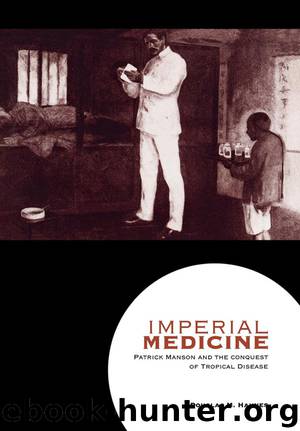Imperial Medicine by Haynes Douglas M.;

Author:Haynes, Douglas M.;
Language: eng
Format: epub
Publisher: University of Pennsylvania Press
5
Domesticating Tropical Medicine
The Formation of the London School of Tropical Medicine
IN the late 1890s, the British medical profession and the Colonial Office engaged in a heated dispute over the training of prospective imperial doctors. The designation of the London School of Tropical Medicine as a single portal institution for entry into the colonial medical services of the dependent empire ignited this dispute (Figure 14). As proposed by Patrick Manson in 1897, the London School trained prospective colonial medical officers as well as civilian practitioners who contemplated practicing in the tropical empire. But the privileged function of the school provoked protest from the profession at large. Some objected to the arbitrary decision process in selecting the Royal Albert Docks Branch Hospital of the Seamen’s Hospital Society. Others, such as administrators of medical schools, resented the subordination of their courses to those of the new school. Still others regarded the whole affair as betraying a complete disregard for the authority of the profession to determine how best to train imperial doctors.
In light of the long-term involvement of the British medical profession in the processes of imperialism, it would be easy to view this dispute as an exception in an otherwise harmonious relationship with the imperial state. In truth, this conflict over tropical medicine reflected the historically uneven power relationship between the imperial state and the medical profession. The component parts of the imperial state, that is, the Colonial Office and the colonial governments, used their economic power over medical professionals to secure the cost-efficient delivery of health care to a highly decentralized empire. The Colonial Office recruited prospective imperial doctors from a large pool of underemployed general practitioners in the metropole; colonial governments deployed them in their respective colonial medical services. As employers, colonial authorities possessed a wide range of tools to maximize the labor and performance of imperial doctors as primary-care givers, ranging from discretionary salary increases and performance-based financial incentives to punitive checks on private practice.
The medical profession could not afford to ignore the economic exploitation of its brethren in the empire. For a profession unable to monopolize the provision of health care, the condition of imperial doctors mirrored the uneven power relationship between providers and consumers in a highly competitive domestic medical market. If anything, overcrowding in the profession during the 1880s and 1890s only strengthened the interest of all practitioners in defending the social position of professionals as salaried employees of the state. This social crisis spurred practitioners to seek out appointments in the colonial medical services as occupational safe havens. It also had the effect of broadening the call for professionalizing the colonial services, as the leverage of the imperial state grew even more powerful. In a word, the profession wanted entry and career advancement in the services based on the specialist understanding of tropical disease rather than on the discretionary power of imperial and colonial officials as employers.
Download
This site does not store any files on its server. We only index and link to content provided by other sites. Please contact the content providers to delete copyright contents if any and email us, we'll remove relevant links or contents immediately.
Fanny Burney by Claire Harman(26317)
Empire of the Sikhs by Patwant Singh(22807)
Out of India by Michael Foss(16710)
Leonardo da Vinci by Walter Isaacson(12891)
Small Great Things by Jodi Picoult(6745)
The Six Wives Of Henry VIII (WOMEN IN HISTORY) by Fraser Antonia(5272)
The Wind in My Hair by Masih Alinejad(4890)
A Higher Loyalty: Truth, Lies, and Leadership by James Comey(4628)
The Crown by Robert Lacey(4613)
The Lonely City by Olivia Laing(4608)
Millionaire: The Philanderer, Gambler, and Duelist Who Invented Modern Finance by Janet Gleeson(4164)
The Iron Duke by The Iron Duke(4158)
Papillon (English) by Henri Charrière(3988)
Sticky Fingers by Joe Hagan(3952)
Joan of Arc by Mary Gordon(3851)
Alive: The Story of the Andes Survivors by Piers Paul Read(3791)
Stalin by Stephen Kotkin(3755)
Aleister Crowley: The Biography by Tobias Churton(3461)
Ants Among Elephants by Sujatha Gidla(3300)
